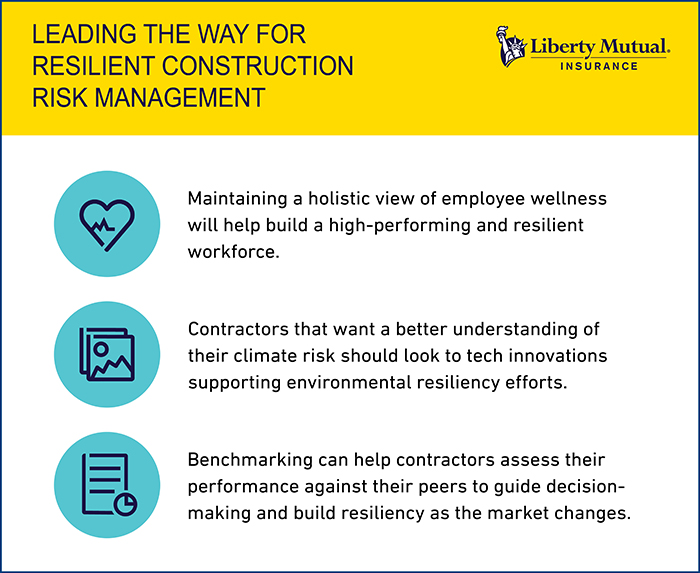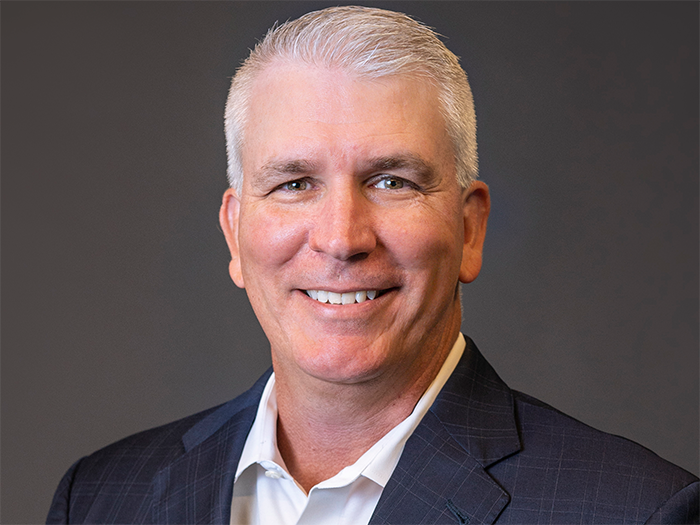Sponsored: Liberty Mutual Insurance
3 Ways the Construction Industry Can Build Resiliency into Risk Management

In a time of ever-growing risk, there is one key tool every construction project should have in its toolbelt to persevere: a focus on resiliency.
Resiliency has become more than a buzzword for the industry as risks continue to abound across several areas. In recent months, the coronavirus pandemic has compounded risk for the construction industry, but factors such as climate change, employee safety, technology adoption, and more also continue to add pressure.
“Contractors must have an eye toward resiliency in order to maintain productivity while also mitigating risk,” said Ben Beauvais, construction executive, field distribution, Liberty Mutual Insurance.
“By understanding the different challenges that a construction site and the entire industry face, contractors can better adapt to disruptions and keep their projects and budgets on track.”
Here are three ways the construction industry can work toward that vital resiliency.
1. Prioritize employee safety and wellness.

Ben Beauvais, Construction Executive, Field Distribution, Liberty Mutual Insurance
Worker safety continues to be a large part of construction risk management, as investing in and engaging with employees helps drive overall business performance.
“To help protect employees and maintain productivity, having comprehensive programs that address on-site safety and return to work after an injury are critical,” Beauvais noted.
But managing and mitigating physical injury is just one piece of employee safety; taking a holistic view that considers professional and personal factors that may affect an employee’s well-being is becoming increasingly more relevant to building resiliency.
“Challenges such as opioid misuse and mental health issues have affected the construction industry well before the pandemic. But now, with more financial strain and fewer available resources, employees are being affected more acutely,” Beauvais explained. “By taking a proactive interest in an employee’s well-being on and off the job site, construction risk managers can help build more high-performing and resilient teams.”
One way to prioritize that holistic approach and better engage employees is through an employee assistance program (EAP).
“For many of our customers, opioid misuse and mental health issues among the workforce continue to be pain points,” Beauvais said.
“We wanted to find a way to ease this burden, support employees and help our customers optimize performance, even during such a chaotic time. That’s why we formed a new partnership to offer EAP solutions to support employees beyond just the physical recovery from a workplace injury.”
While a lot of small and midsize privately-owned construction companies are somewhat less likely to have an employee assistance plan, “we find that, for those that do put a high importance on worker well-being, they have a better outcome of employee engagement,” Beauvais said. “We also view it as preventive in a lot of ways, helping mitigate future, and often more costly, risks.”
2. Proactively address future liabilities related to the changing environment and climate.
In addition to investing in their people, contractors and owners should consider the lasting impact the local environment can have on new building projects. As construction companies create the buildings of tomorrow, they’re increasingly seeking ways to mitigate their future risk.
“By fully examining the environment — like soil conditions, the slope of the land or the location on a potential flood plain — and the risks they could present for a project, contractors can create more resilient buildings that better withstand severe weather and other natural catastrophes,” Beauvais said.
Having this understanding is especially important in the real estate development world, where construction projects of all types and sizes occur in different geographies. And leveraging technology plays a key role in building resiliency and being prepared for the future.
“From drones to building information modeling, technology in construction is constantly evolving,” said Beauvais. “These advancements have opened the door for contractors to collect and utilize data to better address environmental risks.”
An example of how Liberty Mutual is helping to enhance resiliency and accelerate understanding of climate risk for its construction customers is through its partnership with Jupiter Intelligence, a leading provider of predictive data and analytics for climate risk.
“The partnership allows us to better meet the complex risk management needs of our construction clients by understanding how to successfully identify, mitigate, and manage climate-related hazards with new insurance solutions,” Beauvais explained.
Contractors and business owners can also leverage this information to understand implications for current and future operations.
“We’re excited about how our work with Jupiter Intelligence can help our customers build resiliency into the construction process right from the start,” he said.

3. Take a data-driven approach to decision making.
Business and risk are changing more quickly than ever before — and construction companies are evolving their operations as a result. While making the right decisions can be invaluable, making the wrong ones can create operational and financial challenges that make it difficult to compete.
Taking a data-driven approach to decision making, one that considers current performance compared to peers and best practices, is also critical to building resiliency.
“Construction contractors and owners want to know how their performance stacks up against competitors,” Beauvais said. “They also want to know that the efforts they are putting in are meeting the best practices out there.”
To help clients make the best decisions possible, especially during uncertain times, Liberty Mutual offers consulting services and benchmark reporting to its surety customers.
“Our surety team has a tremendous amount of experience assessing financial metrics for construction companies and extensive access to valuable industry information,” Beauvais added. “The reports analyze factors like liquidity, leverage, profitability, cash flow, efficiency and backlog ratios to help clients address gaps and maintain competitive advantage relative to their peers.
“This information can be a real game changer for companies looking to grow or adjust their operations,” he continued. “These capabilities are helping contractors and owners adopt best practices, make improvements, and know where they stand within the industry so they can maintain an advantage as they bid and build.”
With customized reporting and insights, surety customers can better assess what is working and where areas of opportunity exist, keeping them informed and positioning them for resiliency.
Partnering with a Carrier that Knows the Value of Resiliency in Construction
What makes resilient risk management so vital is its inherent ability to help a business bounce back after an incident. This is something the Liberty team proactively helps its customers achieve.
“Our goal is to bring new capabilities and partnerships together to assist customers in tackling their toughest challenges so they can move forward,” said Beauvais.
Liberty knows that when it comes to maintaining a resilient risk management strategy for construction businesses, partnering with a team that has deep understanding of the construction industry and a proven track record of identifying the right solutions is critical.
“Understanding the risks that are present on the insurance side and having an eye toward resiliency enable us to understand, anticipate and execute as we help clients build their infrastructure,” Beauvais said.
“By listening to our customers and developing solutions to respond to their needs — whether that’s through data, technology or risk management products — they can more confidently prepare for whatever lies ahead.”
To learn more, visit: https://business.libertymutualgroup.com/business-insurance/industries/construction-insurance-coverage.
![]()
This article was produced by the R&I Brand Studio, a unit of the advertising department of Risk & Insurance, in collaboration with Liberty Mutual Insurance. The editorial staff of Risk & Insurance had no role in its preparation.








